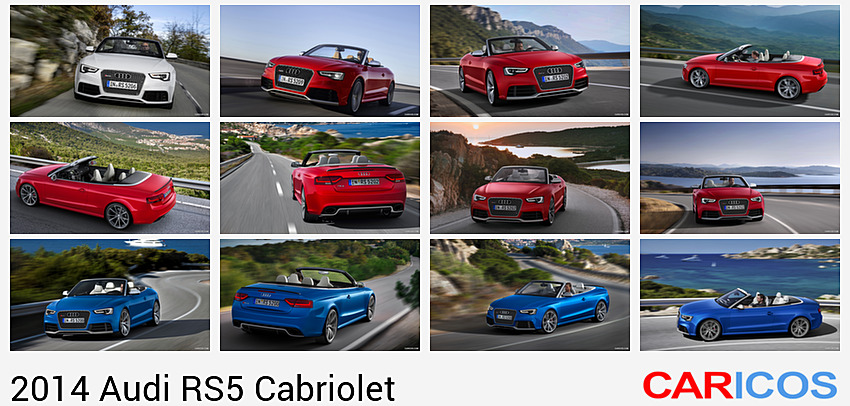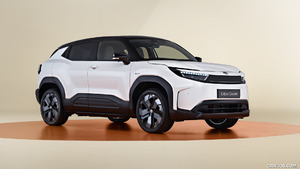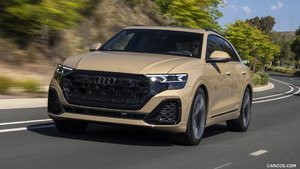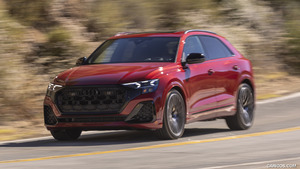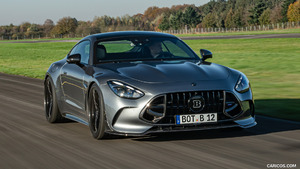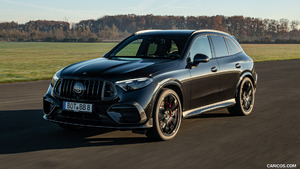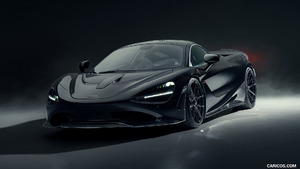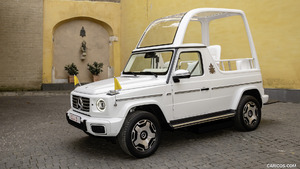Audi RS5 Cabrio
- Audi extends its model series with a high-end convertible
- 4.2 FSI engine with 331 kW (450 hp), zero to 100 km/h (62.14 mph) in 4.9 seconds
- Elegant and spacious body with lightweight cloth soft top
Dynamic performance where the sky’s the limit – the new Audi RS 5 Cabriolet entices with a scintillating combination of power and elegance. The four-seat convertible, which is built in Neckarsulm by quattro GmbH, combines its distinctly sporty character with the exhilaration of open-top driving.
The high-revving V8 FSI develops 331 kW (450 hp) from its 4.2 liters of displacement, accelerating the Audi RS 5 Cabriolet from zero to 100 km/h (62.14 mph) in 4.9 seconds. The seven-speed S tronic and the quattro permanent all-wheel drive system reliably transmit power to the road. The chassis also boasts a wide array of high-tech solutions, ranging from carbon fiber brake discs to the sport suspension plus with Dynamic Ride Control (DRC). Sophisticated assistance and infotainment systems round out the offering.
The 4.2-liter FSI delivers 430 Nm (317.15 lb-ft) of torque to the crankshaft between 4,000 and 6,000 rpm. It produces 331 kW (450 hp) at 8,250 rpm. The long-stroke naturally aspirated engine develops 79.5 kW (108.1 hp) per liter displacement and special flaps in the exhaust tailpipe vary the sound. The convertible accelerates from a standstill to 100 km/h (62.14 mph) in 4.9 seconds – the best in its class. As an option, Audi can increase the top speed from 250 (155.34 mph) to 280 km/h (173.98 mph). The combined fuel consumption of the powerful V8 is 10.7 liters per 100 km (21.98 US mpg).
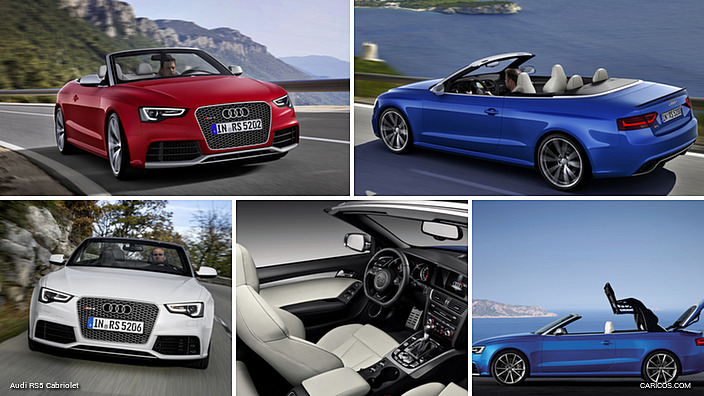 2014 Audi RS5 Cabriolet
2014 Audi RS5 Cabriolet
Thanks to the long ratio of its highest gear, the seven-speed S tronic makes a substantial contribution to efficiency. Drivers can employ the automatic dual-clutch transmission for instantaneous and smooth shifts in the D and S programs, or they can shift manually using the paddles on the steering wheel. In its latest evolutionary stage, the quattro permanent all-wheel drive system features the self-locking crown-gear center differential and torque vectoring. Audi also offers the optional sport differential for the rear axle, which actively distributes power between the wheels.
Aluminum is used for much of the five-link front suspension and the self-tracking trapezoidal-link rear suspension on the Audi RS 5 Cabriolet. The speed-dependent power steering system is highly efficient with its electromechanical drive unit. The body is built 20 mm (0.79 in) lower to the groundthan on the Audi A5 Cabriolet, the axle mounts are stiffer, the anti-roll bars are larger and stronger. Aluminum forged wheels, size 9 J x 19 with 265/35 tires, come as standard, and Audi offers optional 20-inch wheels as well.
Internally ventilated, perforated discs in a weight-saving wave design (3 kg) (6.61 lb) lower in weight) bring the car to a stop; pins are used to join the discs to the aluminum brake pots – a concept adopted from motorsport. The front brake callipers operate with eight pistons each; Audi can deliver the car with fiber-reinforced ceramic discs as an option. The ESC stabilization system with Sport mode can be fully deactivated, if the driver prefers.
Audi drive select is a standard feature in the RS 5 Cabriolet. The driver can use this function to vary the characteristics of main technology components. These include the throttle valves, the seven-speed S tronic, the steering and the exhaust system sound flaps as well as the optional components: sport differential, dynamic steering, adaptive cruise control and the sport suspension plus with Dynamic Ride Control (DRC). The latter entails a hydromechanical system that operates without any delays; the shock absorber characteristic can be adjusted over three different maps.
Striking dynamism: exterior design
The dynamism of the Audi RS 5 Cabriolet instantly catches the eye thanks to its consummately balanced lines. Wedge-shaped headlights with wave-like lower edges illuminate with xenon plus lamps and LED strips for the daytime running lights. Large air intakes are embedded in the distinctively shaped front apron whose ends run out into splitter edges.
The frame of the hexagonal Singleframe grille is designed in matt aluminum look. Sill add-ons and wheel housing extensions dominate the car’s appearance in side profile.
The door mirror housings have a matt aluminum look, while anodized aluminum accentuates the windshield frame. The LED rear lights feature light strips. A spoiler lip in matt carbon increases downforce at the rear. The lip can also be painted in the exterior color as an option.
The lightweight textile soft top spans the interior of the 4.65 meter (15.26 ft) long Audi RS 5 Cabriolet like a low curved dome; a foam layer in the roof delivers high acoustic comfort. At the press of a button, the soft top can be opened or closed in 15 seconds or 17 seconds respectively – the top stows in just 60 liters (2.12 cubic ft) of the 380 liter (13.42 cubic ft) of luggage compartment when it is down. The split rear seatbacks can be individually folded to provide a large load-through space.
Entirely in black: the interior
The interior of the four-seat convertible is finished entirely in sporty black; the inner soft top liner can be ordered in an optional star silver color. Carbon inlays are standard; optional alternatives include two different aluminum versions, a black piano finish and stainless steel mesh. Fine chrome accents and high-gloss black trim highlight the car’s exclusivity.
The leather-covered multifunction sports steering wheel in the RS 5 Cabriolet has a flat bottom; the black dials contrast with white numerals. The driver information system can display a menu with lap timer and an oil temperature gauge. The S sports seats with integrated head restraints feature power adjustment; they are upholstered in a combination of leather and Alcantara, with Fine Nappa leather also available as an option. The leather is pigmented to inhibit heating by sunlight.
All of the display elements and controls in the Audi RS 5 Cabriolet, including the monitor of the optional MMI navigation plus system, boast outstanding ergonomics. Exclusive optional equipment, advanced driver assistance systems and state-of-the-art infotainment modules round out the user control strategy. The lineup ranges from three-stage head-level heating and adaptive cruise control to Bluetooth car phone online, which integrates Audi connect services in the vehicle. In Germany, customer deliveries of the Audi RS 5 Cabriolet begin in early 2013. The base price in the domestic market will be 88,500 euros.
Engine
The 4.2 FSI in the Audi RS 5 Cabriolet combines high torque with spontaneous response and dynamic high-revving flexibility. The naturally aspirated V8 produces 430 Nm (317.15 lb-ft) of torque from 4,000 to 6,000 rpm. At 8,250 rpm, it develops 331 kW (450 hp) from 4,163 cc of displacement; the high-revving fun is not electronically limited until 8,500 rpm. The specific power output is 79.5 kW (108.1 hp) per liter engine displacement; each hp only needs to move 4.27 kg (9.41 lb) of vehicle weight.
The 4.2 FSI accelerates the Audi RS 5 Cabriolet from 0 to 100 km/h (62.14 mph) in 4.9 seconds. The car’s top speed is limited to 250 km/h (155.34 mph); at customer request, Audi can boost this to 280 km/h (173.98 mph). Despite its high performance, the powerful V8 delivers astonishingly high efficiency: in the NEDC cycle, the eight-cylinder unit has a combined fuel consumption value of 10.7 liters per 100 km (21.98 US mpg). The cylinder liners and the chain drive have been optimized for minimal friction, and the oil pump features need-based control.
Audi RS 5 Cabriolet: performance and fuel economy
| 0 – 100 km/h (62.14 mph), s | 4.9 |
| Vmax km/h | 250 (155.34 mph) (optional 280) (173.98 mph) |
| Fuel consumption NEDC, l/km | 10.7 (21.98 US mpg) |
| CO2 emissions, g/km (combined) | 249 (400.73 g/mile) |
Audi manually assembles the 4.2 FSI at its Hungarian engine plant in Györ. The engine features a classic cylinder angle of 90°; the two banks are offset by 18.5 mm (0.73 in). With a stroke/bore ratio of 92.8 mm (3.65 in) to 84.5 mm (3.33 in), the V8 has a long-stroke design. Its valve covers are painted red. The high-performance V8 tips the scales at just 216 kg (476.20 lb). The forged-steel connecting rods, the pistons forged from a high-strength aluminum alloy and the forged crankshaft are lightweight yet extremely strong. The crankcase is produced in a low-pressure die-casting process that ensures very good material uniformity. Its aluminum-silicon alloy combines low weight with high strength. Its high silicon content makes the cylinder liners extremely wear-resistant.
In the crankcase, with its bedplate design, a frame supports the bearing blocks for the crankshaft, ensuring maximum strength and optimal vibration characteristics. The cast iron bearing blocks control thermal expansion of the crankcase, which maintains play at the main bearings of the crankshaft within tight limits.
Like all Audi gasoline engines, the fuel is distributed to the 4.2 FSI by means of common-rail direct injection. The fuel swirls intensely in the combustion chambers, which cools the chamber walls. This process minimizes the risk of autoignition of the mixture on hot spots. This results in an exceptionally high compression ratio of 12.5 : 1, which has a beneficial effect on both performance and efficiency.
The four camshafts, which can be hydraulically adjusted through 42 degrees of crankshaft angle, are actuated by chain drives running on the back side of the engine. Roller-type cam followers actuate 32 large-diameter valves – 33.9 mm (1.33 in) on the intake side, 28.0 mm (1.10 in) with the sodium-cooled exhaust valves. The intake manifold is made of plastic.
The 4.2 FSI naturally inducts intake air and exhausts gases freely thanks to sophisticated fine-tuning on the twin-pipe intake and exhaust system with the two throttle valves. Vacuum-actuated tumble flaps are integrated into the intake ports. Controlled by the engine management system, they cause the intake air to flow with a cylindrical swirling motion at part load, which improves combustion speed and, in turn, efficiency.
The exhaust system pipes are produced from stainless steel using hydroforming; flaps are installed in the two large tailpipes. If they open at high load and revs – or at the push of a button in the Audi drive select system –, making the sound of the V8 even fuller. As an option, Audi can deliver the car with a sport exhaust system with black tailpipe trim, also with flap switching function.
Audi RS 5 Cabriolet: the 4.2 FSI
| Displacement, cc | 4,163 |
| Bore/stroke, mm | 84.5/92.8 (3.33 in/3.65 in) |
| Compression ratio | 12.5/1 |
| Power output, kW (hp) | 331 (450) at 8,250 rpm |
| Torque, Nm | 430 (317.15 lb-ft) from 4,000 to 6,000 rpm |
Drivetrain
The seven-speed S tronic makes an important contribution to the efficiency of the Audi RS 5 Cabriolet – its long seventh gear is designed to improve fuel economy, while its six lower gears feature sporty gear ratios. Engineers made specific modifications to the dual-clutch transmission compared to the standard production model, focusing on such areas as the transmission fluid supply and clutches.
The seven-speed S tronic consists of two subunits, and two multi-plate clutches control the gears. The large K1 clutch located on the outside transfers torque via a solid shaft to the gear wheels for gears 1, 3, 5 and 7.
A hollow shaft rotates around the solid shaft. It is connected to the smaller K2 clutch, which is integrated inside the K1 clutch, and which controls gear wheels for gears 2, 4 and 6, as well as reverse.
Both transmission subunits are continuously active, but only one is connected to the engine at any given time. For example, when the driver accelerates in third gear, the fourth gear is already engaged in the second transmission subunit. The shifting process involves switching the clutches – K1 opens and K2 closes. This takes just a few hundredths of a second with virtually no loss of tractive force; the process is dynamic, smooth and comfortable.
The seven-speed S tronic in the Audi RS 5 Cabriolet can be used in a variety of modes. Fully automatic modes include D (Drive) and S (Sport). The mode selected in Audi drive select is also integrated in the management. If the driver shifts manually using the selector lever or the paddles behind the steering wheel, the operating mode is extremely sporty – when accelerating, the S tronic no longer upshifts by itself. In dynamic mode in Audi drive select the downshift is accompanied with a dose of double-declutching.
State-of-the-art technology: the quattro drivetrain
The Audi RS 5 Cabriolet features the very latest version of the quattro drivetrain – with the self-locking crown-gear center differential and torque vectoring. At its heart lie two crown gears which rotate inside the differential; they owe their name to the crown-like design of their teeth. The front crown gear drives the output shaft to the front differential, the rear crown gear drives the propshaft to the rear axle. The two crown gears intermesh with four rotatable pinion gears, which are arranged at right angles to each other.
Under normal driving conditions, the crown gears rotate at the same speed as the differential housing, i.e. the transmission output shaft. Because of their special geometry, they are designed to have unequal lever effects: Normally 60 percent of the engine torque goes to the rear differential and 40 percent to the front differential.
If the torques change because one axle loses grip, this leads to different speeds and axial forces inside the differential and the integrated sets of plates are pressed together. The resulting self-locking effect diverts the majority of the torque to the axle with the better traction; up to 85 percent can flow to the rear axle. If the rear axle has less traction, up to 70 percent of the torque is diverted to the front axle.
With this extremely broad torque distribution range, the crown-gear center differential surpasses its predecessors. Forces are redistributed virtually without any time lag and absolutely consistently; the entirely mechanical operating principle guarantees maximum efficiency and instantaneous response. Other advantages of the technology are its compactness and low weight of 4.8 kilograms (10.58 lb).
Intelligent software solution: torque vectoring
The crown-gear differential in the Audi RS 5 Cabriolet works together with an intelligent software solution in the brake management system – the torque vectoring system, which acts on all four wheels. If during fast cornering the control unit detects that the wheels on the inside of the curve, which are under a reduced load, are about to slip, it brakes these wheels slightly - all that it takes is minimal pad pressure on a brake disc.
Torque vectoring works smoothly and continuously. The RS 5 Cabriolet maintains neutral handling for a long time even at performance limits. If the ESC stabilization control still needs to intervene, it does so later and gently.
As a complement to the quattro drivetrain, the optional sport differential is available, which actively distributes torque between the rear wheels. When turning into or accelerating in a curve, the majority of the torque flows to the outside wheel and pushes the four-seat convertible into the curve, counteracting the tendency to oversteer or understeer early.
With the sport differential, a superposition gear is added to each side of the classic rear differential; it comprises two sun gears and an internal gear which turns ten percent faster than the drive shaft. A multi-plate clutch in an oil bath and operated by an electrohydraulic actuator makes the power connection between the shaft and the superposition gear.
When the clutch engages, it steplessly imposes the higher speed of the superposition stage on the outside wheel. The additional torque required is obtained from the inside wheel via the differential. In this process, nearly all of the torque can be directed to one wheel. The maximum difference between the wheels is 1,800 Nm (1,327.61 lb-ft).
The sport differential works just as efficiently in overrun as it does under load and when coasting; it is electronically controlled with response times of just a few hundredths of a second. The controller calculates the ideal distribution of the forces for each driving situation as a function of the steering angle, yaw angle, lateral acceleration, speed and other information.
The equipment and data specified in this document refer to the model range offered in Germany. Subject to change without notice; errors and omissions excepted.
Chassis
All the important wheel suspension components consist of aluminum, which substantially reduces unsprung masses. The five-link front suspension processes the longitudinal and lateral forces that act on the vehicle separately. The aluminum frame to which it is linked makes the front end extremely rigid. The springs and dampers of the self-tracking trapezoidal link rear suspension are independent, which improves their response. The links are mounted on a steel subframe.
The electromechanical power steering conveys differentiated feedback to the driver. Power assistance is adapted to the road speed; the ratio of 16.3:1 is sporty and direct. The steering system works closely together with the optional Audi active lane assist system. When braking on a surface that is slippery on one side, it assists the driver by increasing power assist to support the proper steering corrections and prevent incorrect steering inputs.
In straight-line driving, the electric motor of the steering system in the RS 5 Cabriolet does not consume any energy, reducing fuel consumption by up to 0.3 liters (0.08 US gallons) per 100 km (62.14 miles). Thanks to its concentric design with the rack and pinion, the steering gear is very compact.
Decidedly firm: the setup
The RS 5 Cabriolet will launch with dynamic tuning; the body has been lowered by 20 mm (0.79 in). The shock absorbers are stiff, taut springs ensure sporty elasto-kinematics, and the tubular anti-roll bars are larger and stronger than on standard production models.
Audi offers the sport suspension plus with Dynamic Ride Control (DRC) as an option – the compact, lightweight system minimizes body movements by pure hydromechanical means without delays. Each pair of shock absorbers is interconnected diagonally via hydraulic lines and to one central valve each.
When cornering at speed, the valves send more oil flow to the shock absorber of the deflected outside front wheel to increase its support and reduce lateral tilt. The shock absorbers can be adjusted in three stages via the standard Audi drive select.
Audi drive select takes dynamic handling to new heights on the RS 5 Cabriolet. In addition to the sport suspension plus and the sport differential, both of which are optional, Audi drive select also incorporates the power steering system, seven-speed S tronic, engine throttle valves and the sound flaps of the exhaust system. The driver can vary the functionality of these systems at the push of a button between the modes comfort, auto and dynamic. And if the car is equipped with an MMI navigation system, there is also a customizable fourth mode which offers the driver a wide range of configuration options.
Another optional component is dynamic steering which uses a superposition gear in the steering column. It steplessly varies the steering ratio as a function of speed - from very direct when maneuvering to indirect on the highway. At cornering performance limits, dynamic steering countersteers with minimal pulses, making handling even more dynamic, fluid and safe. It prevents the car from pulling when braking on a surface that is slippery on one side.
Large and elegant: wheels
The new Audi RS 5 Cabriolet is equipped with ten-spoke machine-polished aluminum forged wheels, size 9J x 19 with 265/35 tires. 20-inch wheels with 275/30 tires in three designs are available as options. 19-inch tires, size 8J x 19 with 235/40 R19 tires, are offered for winter use. All of the tires exhibit low rolling resistance without any compromises in handling or braking performance.
Effective: the brakes
Large wave-design brake discs are mounted on the wheels. Discs measuring 365 mm (14.37 in) in diameter and 34 mm (1.34 in) thick are mounted on the front axle; the rear axle features discs measuring 324 x 22 mm (12.76 x 0.87 in). The discs are internally ventilated and perforated; their wave-shaped outer contour reduces weight by about three kilograms (6.61 lb). Stainless steel pins connect the steel friction rings to the aluminum brake pots. This concept, which has its origins in car racing, reduces loads and quickly dissipates heat.
The monoblock callipers painted in high-sheen black with RS logo are also manufactured from aluminum. The front callipers each have eight pistons; single-piston floating callipers are mounted on the rear axle.
For the front axle, Audi offers the option of 380 mm (14.96 in) perforated carbon fiber ceramic discs paired with six-piston callipers in Anthracite Gray. The base material is silicon carbide, a material with a diamond-like crystalline structure that integrates high-strength carbon fibers. Titanium bolts join the friction rings with the pots made out of forged aluminum. The ceramic discs do not fade, and they are extremely strong, powerful, and durable. All in all, they weigh four kilograms (8.82 lb) less than the steel discs, despite their larger dimensions.
The ESC stabilization control is tuned to the dynamic character of the Audi RS 5 Cabriolet. In Sport mode, which can be selected at the push of a button, the engine interventions are deactivated, providing spectacular yet safe drifts when accelerating. The optional hill start assist, a subfunction of the system, makes it easier to drive off on grades by maintaining brake system pressure after the brake pedal is released.
Exterior styling
The RS 5 Cabriolet provides an accomplished combination of Audi’s design idiom and the fascination of a four-seat convertible. The high-performance convertible is 4,649 mm (183.03 in) long and 1,860 mm (73.23 in) wide, but just 1,380 mm (54.33 in) in height. The long hood, a wheelbase of 2,751 mm (108.31 in) and clean lines create a flowing silhouette with finely balanced proportions and striking details.
The tapered Singleframe grille dominates the front end, its side edges extending beyond the hood. A frame in a matt aluminum look encloses the grille, the honeycomb grille insert that sports an RS 5 logo shines in anthracite. The wedge-shaped headlights with wave-like lower edges draw the eye to the vehicle’s exterior, creating the visual sensation of more width. The xenon plus lamps inside the headlights surround the LED strips that form the daytime running lights.
The large side air intakes combine with the flat central intake under the grille to accentuate the width of the front end. The two exterior intakes sport honeycomb grilles and are divided up by vertical and horizontal struts into six segments in each direction. They are integrated into a boldly contoured bumper that tapers into a powerful aluminum-look splitter edge.
An anodized aluminum strip on the windshield frame, a classic feature of all Audi convertibles, lends the vehicle a stylish touch. The decorative trim strips on the window channels and the soft top box cover are made of the same material, and the door mirror housings are finished in a matt aluminum look. Crisp, taut surfaces and sharp contour edges characterize the side lines – the dynamic line runs over the side sills, the sweeping tornado line below the windows. The wide shoulders, the powerfully flared wheel arches, the large wheels and the angular sill trims are testimony to the raw power of the Audi RS 5 Cabriolet.
The lines also emphasize the impression of sporty width at the rear. The luggage compartment cover sports an RS 5 logo and a subtle spoiler lip made out of matt carbon; the lip can also be painted in the body color as an option. The two large, elliptical tailpipe tips of the dual exhaust system enclose the diffuser, which extends far upward.
A contour painted in the body color (available optionally in aluminum look) splits the diffusor into two sections, with the upper section featuring a honeycomb insert.
The RS 5 Cabriolet is available in eight exterior paint finishes – the Ibis White non-metallic finish, the metallic Suzuka Grey, the pearl effect variants Daytona Grey, Misano Red and Phantom Black along with the specially pigmented crystal effect finishes Panther Black, Estoril Blue and Prism Silver. In addition, a virtually unlimited range of customized paint finishes is available exclusively from Audi. The soft top is available in black, gray, red or brown. As options, Audi can install a styling package in matt aluminum as well as an engine compartment design package with carbon trim.
Audi RS 5 Cabriolet: key dimensions
| Length, mm | 4,649 (183.03 in) |
| Width, mm | 1,860 (excluding exterior mirrors) (73.23 in) |
| Height, mm | 1,380 (54.33 in) |
| Wheelbase, mm | 2,751 (108.31 in) |
| Front track, mm | 1,586 (62.44 in) |
| Rear track, mm | 1,582 (62.28 in) |
Convertible top and body
The soft top with the large glass rear window covers the interior like a low curved dome. It is much lighter than a folding steel roof, which reduces overall weight. Available as standard with an acoustic hood, the soft top reduces wind noise to virtually the level of a coupé. A foam layer, which is up to 15 mm (0.59 in) thick, is inserted between the soft top cover and the interior lining. A LED lamp illuminates the rear seating area.
If the driver presses the opening button on the centre tunnel console or on the optional convenience key, a high-pressure hydraulic pump and four servo cylinders are activated. The soft top opens in 15 seconds and closes in 17 seconds, and can be operated at speeds up to 50 km/h (31.07 mph). A central switch activates the four window controls simultaneously. The opened hood disappears under a solid lid, where it folds compactly. Its roof compartment, made out of a heavy-duty textile mat, takes up just 60 liters (2.12 cubic ft) of luggage compartment capacity – the remaining 320 liters (11.30 cubic ft) constitute a best-in-class figure.
As with any Audi, the body of the RS 5 Cabriolet offers outstanding strength, providing the basis for precise handling, superior crash safety, and peace of mind. Form-hardened steels are used in the passenger cell area – a change in temperature during forming gives the steels extremely high tensile strength coupled with lower weight.
Specially developed reinforcement components compensate for the absence of a metal roof. In the front section, diagonal struts run from the side sills to the subframe; similar components are mounted to the rear section. The side skirts feature ultra-high-strength walls. The tubes, which reinforce the A-pillars, are formed by hydroforming and are extremely rigid.
A solid aluminum frame, which houses the rollover protection, is located between the interior and luggage compartment. In the case of an imminent rollover, pre-tensioned springs instantly push up aluminum supports behind the rear head restraints.
In the event of a side impact, head/thorax side airbags are ready in the seats; airbags protect the driver and the front seat passenger in a frontal impact – the control unit detects the relevant seat positions in this case. Thus the unit can adaptively control the triggering of seat belts and airbags. In a rear-end collision, the integral head restraint system averts the danger of whiplash injuries.
The front fenders of the RS 5 Cabriolet are made of aluminum to reduce weight and to optimize the distribution of axle loads. Sophisticated fine-tuning measures, including a fully covered underbody, improve the airflow and, in turn, acoustics as well as fuel efficiency.
Interior
The interior entices with its high-quality workmanship. User controls are intuitively simple – one of Audi’s classic strengths. All the buttons, switches, and levers are exactly where the driver expects them to be.
Trimmed in perforated leather, the multifunction sports steering wheel comes with a strong, flat-bottomed rim. The shift paddles come with an aluminum-look finish. The driver information system displays on request a RS-specific menu including lap timer and an oil temperature gauge. Just like the MMI monitor, the system displays an RS welcome page as the vehicle is started. The speedometer and rev counter have black scales, white dials and red needles. The standard S front sports seats come with high bolsters, a removable seat cushion, four-way lumbar support, integrated head restraints, heating, and power adjustment. RS 5 logos are embossed in the backrests. Seat covers come in a combination of black leather and Alcantara, black or moon silver fine Nappa leather with piped seams in rock grey are available as an option. All grades of leather are pigmented to inhibit heating by sunlight. As an alternative to sports seats, Audi can also fit bucket seats for luxurious climate-controlled comfort seats with ventilation function. The Audi exclusive range includes exquisite leather packages, including bucket seats covered in diamond-quilted fine Nappa leather.
The interior of the RS 5 Cabriolet is finished in black; as an option Audi can also supply the soft top headlining in star silver. Carbon inlays are standard in the interior, but alternative inlays are also available optionally at no extra charge in matt brushed aluminum or Aluminum Race with its three-dimensional effect, black piano finish or light stainless steel mesh. The Audi exclusive range includes a selection of wood veneers as well as many other individualization options.
The surrounds on the instrument cluster and the centre console dazzle with their piano finish look; the selector lever knob on the seven-speed S tronic features RS-specific styling. The door openers taper to double, narrow bars – another hallmark RS detail. The pedals, the footrest, the air vent frames, the MMI buttons and many other controls shine with their aluminum-look finish, aluminum inserts adorn the door sill trims. RS 5 logos add striking touches in the interior.
The backrests of the two-seater rear seat bench have sporty contours and are symmetrically split. They can be unlocked by actuating levers in the trunk and drop automatically onto the seat cushions thanks to pre-tensioned springs. The large standard pass-through provides a total loading length of 1.76 meters (5.77 ft) and 750 liters (26.49 cubic ft) of stowage space. Audi offers a ski/snowboard bag as an option.
Equipment and trim
The Audi RS 5 Cabriolet will go on sale to customers in Germany in early 2013, with a base price of 88,500 euros. The standard equipment is wide-ranging – apart from the features already mentioned, the lineup includes parking system plus, automatic belt feeders, an electromechanical parking brake, automatic climate control, wind deflector, concert radio with CD player and eight loudspeakers, a lighting package, and a restraint system package that includes six airbags, integral Audi head restraint system, and ISOFIX anchor points for child safety seats in the rear.
Customers looking for even more comfort will find what they are looking for in the Options items. The range includes the convenience key, the high-beam assist, adaptive light, head-level heating, rear seat heating, memory function for the driver’s seat and deluxe automatic air conditioning with three-zone control.
All of the assistance systems from the A5 series are available in the new Audi RS 5 Cabriolet. The driver information system with rest recommendation function is standard; it detects when the driver is getting tired.
Adaptive cruise control maintains the four-seat convertible at the required speed and at a constant distance to the vehicle ahead; at speeds below 30 km/h (18.64 mph) it can trigger emergency braking should the need arise. Audi side assist makes changing lanes safer, Audi active lane assist uses slight steering interventions in the electromechanical power steering to help the driver to stay in the driving lane, and the parking system plus with reversing camera facilitates maneuvering.
The system lineup is just as extensive when it comes to infotainment. The top-of-the-line version is the MMI navigation plus – a high-end media control center with large hard drive, DVD player and seven-inch color monitor with 3-D graphics.
The Bang & Olufsen Sound System controls 12 loudspeakers with an output of 505 watts.
The Bluetooth car phone online provides the perfect complement to MMI navigation plus – it connects the Audi RS 5 Cabriolet to the Internet via a UMTS module. Passengers can use their mobile devices to seamlessly access the web via the integrated WLAN hotspot. For the driver, the system delivers customized online services from Audi connect to the car – they range from Audi online traffic information to navigation with images from Google Earth and Google Maps Street View and Audi music stream web radio.

